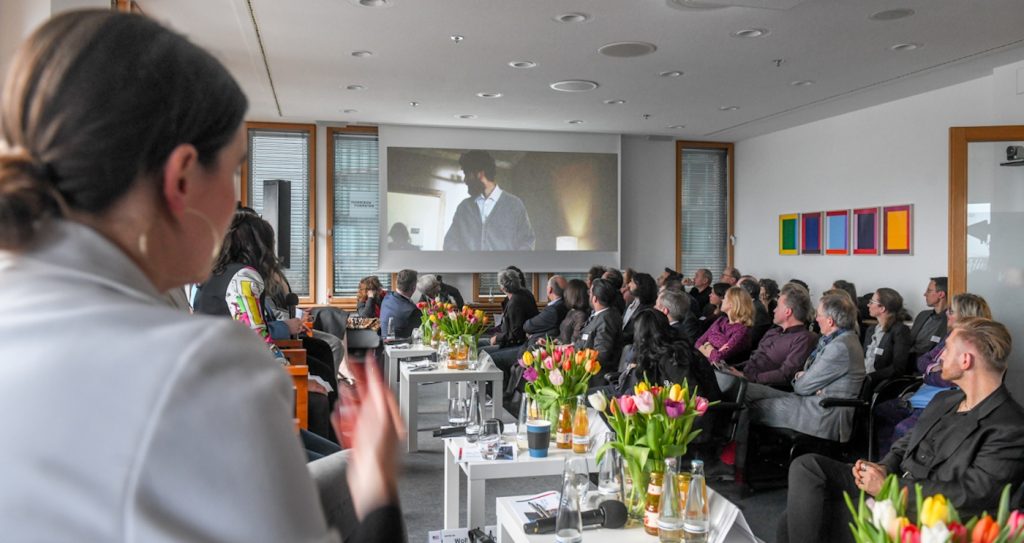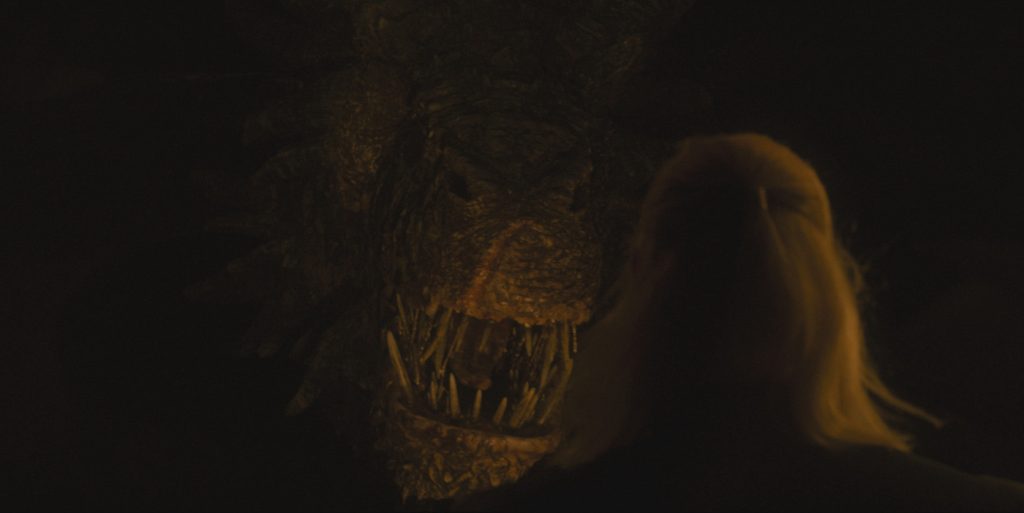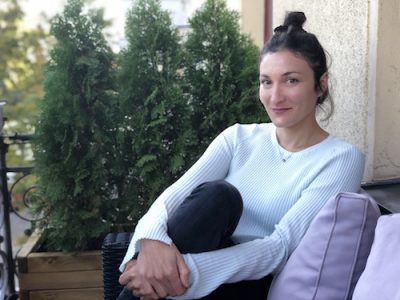Lights, Camera, Action (Plan): A Focus on the Filmmakers of Tomorrow at Berlinale
The 74th annual Berlin International Film Festival just drew to a close. Per tradition, the entertainment law firm Morrison & Foerster and the Motion Picture Association gathered some of the festival’s notable attendees for a topical annual panel discussion. This year, co-hosts Christiane Stuetzle, a partner at Morrison & Foerster, and Sabine Henssler, Vice President of Communications for the Motion Picture Association Europe, spoke to a diverse group of young actors and filmmakers for a discussion entitled Next Gen Rising Stars & Skills for Tomorrow.
In his opening remarks, MPA Chairman and CEO Charles H. Rivkin noted that the rising stars on stage were part of a long tradition in filmmaking, calling for and working at the vanguard of change. He cited the 91-year-old filmmaker Edgar Reitz, recipient of this year’s Berlinale Camera award, who was a signatory in 1962 to the Oberhausen Manifesto, a call to arms for a new film culture. “These young artists did something profound. They asked — actually, they didn’t ask, they demanded — the creative community take a really hard look in the mirror and reimagine what cinema could actually be as these moments, these inflection points come around,” Rivkin said.

For the panelists, there were two main contemporary inflection points — community and the new innovative technologies. These topics may seem at odds, but as the discussion revealed, each has a key bearing on the other. As Wolf Plesmann, Managing Director of the German Film and Television Academy Berlin (DFFB), who gave the panel’s impulse statement, pointed out, technology is a component of what students learn at the DFFB, but in doing so, they’re also advised to proceed with caution, keeping in mind the importance of storytelling. In terms of where AI fits in, Plesmann struck a balance — he hopes “that we will all look in the future to see how AI as a tool can help us to do good films, perhaps more efficiently, but still keep the human touch to it alive.”
In her opening remarks, the U.S. Embassy Berlin’s Cultural Attaché, Cherrie S. Daniels, concurred. “So the movies go, so goes the world. Film production has long been a driver, also of technological innovation,” she said, and to that end, “innovative technology, including augmented and virtual reality, and other forms, belong to the skills for tomorrow’s toolkit that filmmakers and all those involved in the creative industries are already using today.” Jonathan Yunger, President of Millennium Films, was enthusiastic about the possibilities for AI in filmmaking. “I wasn’t a fan of AI,” he said, but “after shooting a demon character practically (for a film called The Offering) that didn’t look great, he turned to AI to come up with a new design, on a platform he built himself. “I was able to make 3000 creature designs in an hour. So now I can start to cherry-pick and edit those and then send it to visual effects,” he said.
Yunger stressed that he doesn’t believe AI will replace people — rather, people who use AI will replace those who don’t. “And that’s why I think it’s important for places like film schools to start to learn how to use these tools and these new technologies to further storytelling. The emotion of a human being will never be replaced,” he said.
Other panelists concurred that the human touch remains as important as it ever was. Tamara Denić, a writer and director who won a Student Academy Award in 2023, pointed out that to make it in the industry, “sometimes, even if your inner voice is getting very quiet, it’s important to keep listening to it. Having a job as a director isn’t a job; it’s a passion.” To Denić, two things seem key to get somewhere with that passion: grit and support. “I think one of the most important things in the film industry, and maybe especially as a director and actor — okay, maybe for everyone — is persistence,” she said, alongside support from family and friends and mentors and a professional network. For the latter two, she gave a nod to Armin Schneider, who was also on stage. Schneider, the former Head of European Publicity for Warner Bros., told the audience how, while walking in Berlin’s Tiergarten park during Covid lockdowns, he began thinking about something meaningful he could do for Germany’s filmmaking industry. He went on to found the Young Talent Foundation Berlin, the country’s first privately funded talent foundation, which supports gap financing for fledgling filmmakers and offers scholarships to film students.
Whether private or in connection with the government, organizations like the YTF Berlin were important to everyone on stage. Rabeah Rahimi, who came to Germany from Afghanistan in the 1990s and is now a film director as well as Managing Director of RAR Film GmbH, said that she hopes to be a role model for women in Afghanistan or Iran, and she also believes it would be helpful if the government would go to refugee camps and speak with the girls there. “I wish that there was a stipend for refugee girls,” she said. Marcus Anthony Thomas, a writer and director of the upcoming Space Plug, talked about the impact a mentorship program on the House of the Dragon set had on him. Far beyond an internship, mentees had access to showrunners and directors, had full access to all departments, and “if you wanted to ask VFX a question, you went and spoke to VFX. There wasn’t a meeting we weren’t allowed in,” he said.

On the programming side, Gabriella Kramer-Khan, a creative consultant for Universal Pictures’ Global Talent Development & Inclusion department, explained how the company’s initiative works with young screenwriters not just on writing but the infrastructure around it. “We’re not just developing their screenwriting skills and core skills,” Kramer-Khan said, “but also supporting them in building a support network for themselves throughout the program so that regardless of what the outcome is, and what they do afterward, they’ve always got people and relationships that they can fall back on.” During the panel’s opening remarks, Rivkin noted the MPA’s member studios’ efforts to cultivate new talent, from over 100 creator programs launched across EMEA this year by Netflix to a million-dollar effort by Warner Bros./Discovery/HBO in France to train young workers for jobs in the European television industry.
What industry newcomers experience from one another is just as important as what they learn in training and development programs. In addition to speaking on the MoFo/MPA panel, actress Katharina Stark was one of this year’s Berlinale Shooting Stars, an initiative that gathers a select group of up-and-coming actors to meet with producers and casting directors, take part in workshops, and see films together. Asked what she recommends to fellow young actors, Stark recommended getting advice, mentors, and training, watching films from around the world, and really getting into conversation with industry peers. “I’ve learned so much from all of the others this week,” she said. Stark’s emphasis on watching a global slate of films reflected the importance Rivkin placed on the MPA’s member studios’ efforts to recruit and train young talent from all over to ensure that “the next wave of rising stars reflects the diversity of the world that we actually inhabit together, and to amplify the voices of populations that are largely unseen, unheard, and underrepresented, for way, way too long.”
Correction: A previous version of this article misstated that Jonathan Yunger, President of Millennium Films, turned to AI to create a demon character for the film Hellboy. That film was The Offering.
Featured image: Photo by Tina Merkau. Copyright: Morrison Foerster



